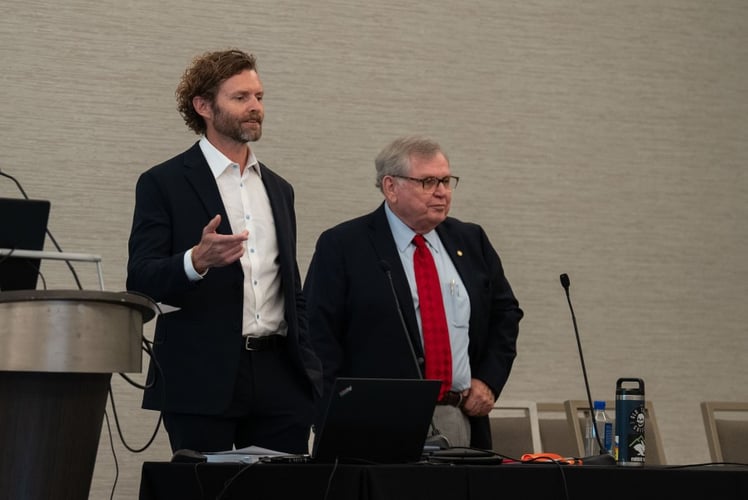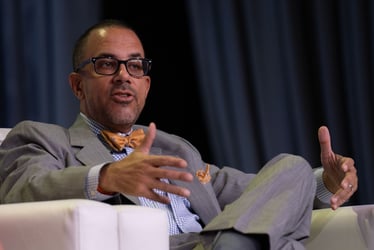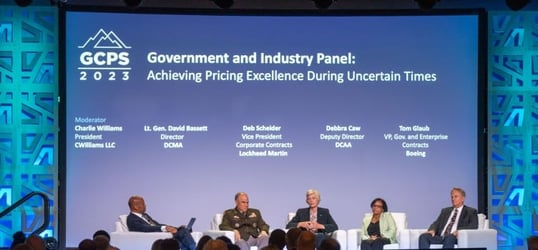Kicking off this year’s GCP Summit in June was a general session composed of government and industry panelists. The following summarizes David Cade’s (VP US Government Services Business Transformation – Boeing) response to the following question on trust posed to the panelists:
How do we improve the level of trust between industry and government? The culture can sometimes feel like the US government thinks industry habitually and intentionally overprices contracts. Contractors seem to think the US government is out to get them and then there are a number of questions around the consistent request for cost data.
David Cade's insightful response offers a comprehensive exploration of the intricate dynamics involved in building trust between industry and government entities. Through his thoughtful analysis, Cade underscores that trust is not merely an abstract concept but rather a tangible outcome of repeated interactions and transparent communication. He draws from the fundamental principles of Game Theory and economics to shed light on how trust can be fostered between these two critical stakeholders.
Cade artfully employs a relatable analogy to illustrate his point. He explains that when parties anticipate engaging with each other on multiple occasions, a natural inclination towards cooperation emerges. This phenomenon, grounded in economic theories and behavioral tendencies, posits that when individuals foresee ongoing interactions, they are more likely to adopt a collaborative approach. This forms the bedrock for cultivating trust between industry and government.
Leveraging his wealth of experience, Cade offers an illuminating case study from Boeing. He narrates a groundbreaking initiative involving a government branch, underscoring the paramount importance of trust in facilitating successful collaborations. By presenting solutions transparently and demonstrating unwavering commitment to their proposals, they managed to capture the government's attention and initiate candid discussions. This real-world example not only underscores the power of trust but also serves as a testament to its role as a catalyst for progress.
Acknowledging the existing challenges that surround data sharing and transparency, Cade astutely observes that both industry and government often harbor reservations owing to the fear of being taken advantage of. To counteract this apprehension, he advocates for a shift from a perfunctory checkbox mentality to a deeper understanding of each other's objectives and expectations. This approach, rooted in mutual comprehension, has the potential to foster transparent exchanges that transcend superficial requirements.
In order to facilitate the development of trust, Cade proposes strategic involvement of senior leaders. By seamlessly integrating these experienced individuals into routine interactions between industry and government teams, a culture of trust, respect, and effective communication can be cultivated. This not only imparts valuable insights but also reinforces the desired behaviors for fostering successful collaboration.
Furthermore, Cade underscores the critical significance of understanding contractual language and regulatory references. He highlights the importance of fostering clarity and comprehension in these documents to ensure that both parties share a common understanding of their commitments. This proactive stance prevents misunderstandings and lays the groundwork for transparent collaborations.
Throughout his response, Cade underscores the historical context of trust between industry and government. He references historical instances such as the conclusion of the Cold War and the First Gulf War, where heightened trust facilitated productive interactions. This historical lens serves to emphasize the cyclic nature of trust development, highlighting that trust-building is an ongoing process that can always be improved upon.
David Cade's perspective on building trust between industry and government serves as a roadmap for bridging gaps and enhancing collaboration. By nurturing transparent communication, understanding mutual needs, and embracing a commitment to lucid language, both parties can progressively cultivate an elevated level of trust that forms the cornerstone of successful partnerships.
If you missed this year’s Government Contract Pricing Summit, we’ll give you a pass this once. Do yourself and your company a favor and don’t let it happen again; another misstep like that is on you. We look forward to seeing you in San Diego, June 11-13, 2024!
.png?width=100&height=100&name=GCP%20Summit%20DSP%20Content%20(7).png)




